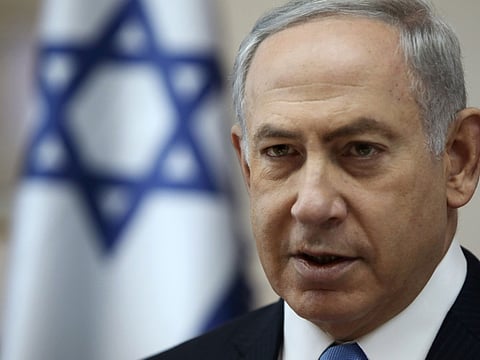Israel stoking the fire of Palestinian flare-up
In the absence of any coherent political measure, and as Tel Aviv continues with its draconian ways, anger and frustration among the youth will only rise

Young Palestinians — marginalised, living in despair and grappling with social problems — must have now realised, a year after their ‘habbah’ (flare-up) broke out, terrifying many of the Israelis, that the Palestinian leadership is not willing to see a new Intifada (uprising) and that the Palestinian political/military factions’ position will not go beyond a few statements here and there. It appears to me that the Palestinian youth are living a chapter in their life where the ‘habbah’ could be billed in the future as a period of “adolescent martyrdom”, according to Palestinian writer Jawad Boulus, or the “betrayed Intifada” according to Israeli writer Amira Hass.
Despite the varied types of attacks against the Israelis over the past year, it certainly looks that the ashes are still burning, which led the Israeli intelligence departments to send out warnings of a possible outbreak of violent clashes in the occupied West Bank according to military expert Amos Harel. He said such clashes might lead to an open military confrontation with Hamas in Gaza and its continuation could heighten security tensions in Israel. Israeli TV correspondent Hezi Simantov was reported as saying that Palestinian security sources had warned that the circle of operations against the Israelis might extend to include breaking into Jewish “settlements” [colonies] and creation of organised cells with two or three attackers taking part in each operation.
A year has now passed, but the Palestinian flare-up has managed to increase fear and anxiety among wide sections of Israelis and their government, as the Zionist state faces an “unknown enemy”. Israeli casualties, according to the most recent report by Israel’s Channel Ten, were 498 — including 40 dead, 458 injured, with 42 in serious condition. The Israeli economy has also sustained huge losses, apart from bearing additional security and military costs.
Reading into Israeli press and political analyses, one can fathom that there is a perceived fear of what is coming, despite the unprecedented “collective punishment” carried out against Palestinian attackers, their families and homes. Israeli writer Alex Fishman said: “We are once more reminded that the recent calm in the (West) Bank is not real and a fire is burning beneath with a young generation ready to go out for sacrifices.” Israeli journalist Nahum Barnea wrote saying “they are not doing it for the sake of Palestine, for the sake of Islam or for the sake of killing Jews. Their goal is to die and the soldiers are their tool”.
Comments by Israel’s Minister of Internal Security, Gilad Erdan, hinted that Israeli measures were ineffective, saying that cameras were installed, intelligence collected, laws against stone-throwers tightened, security cordons imposed on villages and neighbourhoods, homes demolished, preventive arrests conducted and even Palestinian security departments were enlisted to provide help. The world’s best spy devices, he said, were not capable of detecting what goes on inside the heart of a young boy who decides on his own to go out on a kill or run-over attack. He makes his decision, he added, a short time before he heads out on the road, drawing his weapon from his mother’s kitchen.
It is clear that the Israeli position is becoming more extreme. Uzi Dayan, former army deputy chief-of-staff says “terrorists” should be killed, and the judicial verdict should only be a death sentence. In an incident where an Israeli soldier shot and killed young Palestinian Abdul Fattah Al Sharif (a resident of Hebron, the most active city in the Palestinian ‘habbah’) as he lay wounded on the ground, posing no threat to anyone, an Israeli opinion poll showed in August that 65 per cent of Israelis supported the killing. Moreover, a report by the Palestinian Ministry of Detainees and Ex-detainees’ Affairs indicated that Israeli occupation authorities have arrested around 1,000 Palestinian children so far this year, aged between 11 and 18 years — an 80 per cent increase over last year. These children are suffering in difficult conditions in prisons.
There is no doubt that Israel is stoking the fire of the ‘habbah’, by escalating punitive measures, drawing from a premise that blood breeds blood, while insisting on a security solution. This is a notion also supported by Israeli political analyst Eitan Haber who conceded that since former Israeli prime minister Ariel Sharon and Rafael Eitan, a former Israeli general, came out with a military solution, Israel has fought big and small wars that have left thousands dead and wounded, Palestinians arrested, hundreds of homes demolished, a blockade and isolation imposed, and yet no military solution was found. He said there were periods of lull that lasted years, but the volcano would again erupt.
All that has happened, Amos Gilboa writes, is because there is no political process with the Palestinian leadership and no hope for the Palestinian youth who are desperate. It is well-known in the Israeli army, he continues, that in the absence of political steps, there would be no hope to stop the violence. In fact, this habbah will continue as long as the occupation insists on using excessive power, resorting to immediate executions and maintaining an illegal blockade of occupied Palestinian lands, while closing their eyes to crimes committed by the Jewish colonists who are encroaching upon Palestinian land and property.
Professor As’ad Abdul Rahman is the chairman of the Palestinian Encyclopaedia.
Sign up for the Daily Briefing
Get the latest news and updates straight to your inbox



